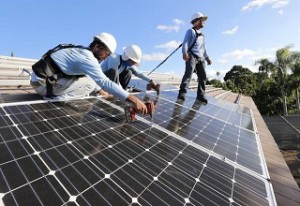With This Level of Impact, Is It Still Correct to Refer to Renewables as “Alternative” Energy?

In a very short period of time, renewable energy has gone from a hobby (Bill Gates once called solar “cute”) to something called “alternative energy.” At 10%, it seems more like “mainstream” may be a better moniker.

It’s fine to celebrate the milestone so long as you aren’t being misled by the numbers.
🙂
Yes it’s a huge step. April will show a similar result.
But during the dog days of summer, when electricity demand is ~33-40% higher, we’ll see less energy produced from lower winds. During the cold days of winter, when energy demand is ~20% higher, we’ll see less energy produced from lack of sun.
We aren’t going to be at 10% wind/solar for the year. We’ll be at ~6%. That’s worthy of celebrating. It’s a great milestone to pass. But the industry is facing headwinds from an administration that honestly wants to enable greater global warming (I assume in an effort to help Russia). So much of the tax subsidies that have helped fuel the boom are going to be in jeopardy, and we may face a significant slow-down in new builds while wind and solar are only comprising ~6% of our grid mix.
We’re not there yet.
😉
But we’re certainly on more solid ground than we have been in the past.
I should have mentioned the seasonality factor, and the important fact that we’re not at a 10% average over the year. Thanks for the clarification.
You’re right, of course, that this is nonetheless an important milestone.
To be 100% renewable I say we need to install 1 solar panel (200 watt) per year for each and every person on earth. Big job!! That’s an additional +/- 1400 gigawatts per year!
Try this for the next 20 years and we should be close to 100%!!
Interesting idea. Fortunately, this isn’t how it’s going to play out, as I’m sure you’re aware. Of course, no one knows exactly how it WILL play out in terms of wind, solar, other renewables, nuclear, and, for a long while to come, natural gas.
So I thought we were trying to get away from fossil fuels (natural gas) to fight climate change. I also thought the nuclear option was out because of obvious dangers. Hydro is about maxed out. What we have left, that would make sense, is solar and wind. The world is off to a fair start with solar and wind but to do what we need to do, 100% renewable by 2050, we need to kick into high gear! Many more gigafactories needed! Many more installers needed! The biggest draw back that I see is how to pay for it all.
The way I see it:
1) Getting to low-carbon energy anytime soon without nuclear will be difficult if not impossible. “Advanced nuclear” is really cool, and we’re getting there.
2) Natural gas will be around for a long while.
3) Wind and solar are variable resources, meaning that large-scale integration will require some combination of storage and long-distance transmission.
4) Hydro is not maxxed out, but I don’t see much potential here, except for niche applications that have huge resources and expensive competitive alternatives.
5) Same for biomass, geothermal and ocean thermal.
Craig,
Your reply to Richard is the most sensible I’ve seen you post for since Trump was elected !:)
Transition to low carbon energy will be a long, evolutionary journey. Replacement technologies, even advanced nuclear, are still decades away from becoming economically effective on a global scale.
R&D on alternatives is proceeding at an astonishing pace, but not sufficiently quickly to satisfy the demands from an alarmist cheer squad for immediate radial measures which are both impractical, and if implemented, catastrophic.
In the meantime opportunities abound outside the arena of energy generation to utilize ‘clean (and cleaner) tech to reduce the planet’s carbon foot print, without being economically disruptive.
Even the dreaded production of energy from coal can be made cleaner, safer, and more efficient. R&D, even commercialization, of carbon sequestration technology and the production of valuable by-products from CO2 etc, is advancing, especially in India and the US.
The Japanese are well advanced with producing miniaturized nuclear power stations. These mini plants fueled by abundant Thorium, . not only solve the problems of waste and safety, but also remove the need for costly, inefficient and vulnerable power long distance transmission infrastructure.
Small and more humble technologies can produce a more immediate impact on reducing environmental harm caused by fossil fuel usage.
1) Reducing the use of bunker oil in shipping (each equals the pollution of 50 million motor vehicles, and is far more toxic). Just 40 out of a fleet of 100,000 equals the pollution created by all the cars on the planet!
2) Replacing lawn and horticultural machinery, (motor mowers etc) with solar electric, is completely possible and economically feasible. The environmental benefits (especially noise) can be effected on a short time scale, with a minimum of disruption.
These are just two. from a vast array of smaller clean tech solutions. These impact of these technologies may seem humble and unexciting, but cumulatively, they add up to providing more environmental benefits than grand, but impractical schemes, requiring unacceptable political and economical conditions.
Thanks. I think of myself as an energy pragmatist. Yes, ideally I’d love to jump ahead 50 years in terms of our energy infrastructure, but that’s not happening, so it’s kind of a waste of time thinking too much about that.